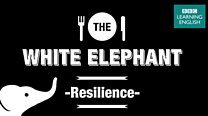Unit 25: English You Need
Exams, news, pronunciation, teachers' tips, learners' questions
Select a unit
- 1 English You Need
- 2 English You Need
- 3 English You Need
- 4 English You Need
- 5 English You Need
- 6 English You Need
- 7 English You Need
- 8 English You Need
- 9 English You Need
- 10 English You Need
- 11 English You Need
- 12 English You Need
- 13 English You Need
- 14 English You Need
- 15 English You Need
- 16 English You Need
- 17 English You Need
- 18 English You Need
- 19 English You Need
- 20 English You Need
- 21 English You Need
- 22 English You Need
- 23 English You Need
- 24 English You Need
- 25 English You Need
- 26 English You Need
- 27 English You Need
- 28 English You Need
- 29 English You Need
- 30 English You Need
Session 5
Learners' Questions
Welcome to Learners' Questions - the series where we answer your queries about the English language. What will this week's learner question be?
Activity 1
Learners' Questions
When, if and in case
Honza from the Czech Republic says: what is the difference between the use of when and if in all types of conditional sentences?
And Trung from Vietnam, who writes: would you please explain to me the differences in use between in case and if?
Watch the video and complete the activity

Dan
Hi guys! Dan for BBC Learning English here with this week's Learner Question. Find out what it is after this.
OK! This week's Learner Question comes from Honza from the Czech Republic, who writes: what is the difference between the use of when and if in all types of conditional sentences? And Trung from Vietnam, who writes: would you please explain to me the differences in use between in case and if? It’s a double learner question. you’re getting value for money now aren’t you? OK, guys – pay attention.
So, we use when for things that are certain to happen in the future. For example, I’ll give you a ring when I get home from work. Now note that although the time reference is clearly in the future, we use the present tense in the when clause.
We use if for things that may or may not happen, or that we’re not certain about. For example, if I decide to come to London this year, I’ll give you a call.
Now in all of these examples we’re talking about future conditions and whether we use when or if depends upon the certainty of things happening in our opinion. However, when and if are interchangeable when we’re talking about things in general. And in this case if can mean whenever. For example, I keep the air-conditioning on at night if, when, or whenever the temperature goes above 30 degrees. Did you get it?
We use in case to talk about taking precautions. That means doing something because something else might happen. For example, I’ve brought some candles in case there’s a power cut. When we use in case, we’re describing possible future situations, but when we use if, we’re talking about conditions that might apply. Compare the difference: I’ll fill up the car with petrol in case you need to go to Brighton. That means, I’ll fill up the car now and you might go later. However, I’ll fill up the car with petrol if you need to go to Brighton means tell me that you’re going to Brighton and then I’ll fill up the car.
Honza, Trung I hope that answers your question. Thank you very much for writing to us. If anybody else out there has a question for Learners’ Questions, you can email us on: learning.english@bbc.co.uk. Please remember to put Learners’ Questions in the subject box and your name and where you’re writing from. We get a lot of emails, guys, and I’m afraid we can’t answer every single one because there are just too many, but we do read them all. And for more information, go to our website: bbclearningenglish.com. That’s it for this week’s Learners’ Questions. I’ll see you next time. Bye!
___________________________________________________________________
Did you like that? Why not try these?
___________________________________________________________________
Summary
when
When is used for things we are certain will happen in the future. Note that even though we are talking about the future, when is followed by a present tense.
I'll give you a ring when I get home from work
if
We use if for things that may or may not happen, or things we are uncertain about
If I decide to come to London this year, I’ll give you a call
when or if?
It depends on how certain the speaker feels at that time. They can be interchangeable when talking in general. In this case, if can mean the same as whenever.
I keep the air-conditioning on at night if, when, or whenever the temperature goes above 30 degrees.
in case
In case is used when talking about taking precautions - something done to avoid something bad.
I've brought some candles in case there's a power cut
if or in case?
In case describes possible future situations, but if describes conditions that might apply. Compare:
I’ll fill up the car with petrol in case you need to go to Brighton. (I’ll fill up the car now and you might go later.)
I’ll fill up the car with petrol if you need to go to Brighton. (Tell me that you’re going to Brighton and then I’ll fill up the car.)
To do
Try our quiz to see what you've learned about this topic.
Learners’ Questions Quiz
4 Questions
Decide if these sentences are correct or incorrect
Help
Activity
Decide if these sentences are correct or incorrect
Hint
Is this person certain it will rain or are they just being careful? Can we use in case in this way?Question 1 of 4
Help
Activity
Decide if these sentences are correct or incorrect
Hint
Can this person be certain that they will win? Is when the right word here?Question 2 of 4
Help
Activity
Decide if these sentences are correct or incorrect
Hint
Is this person specifically mentioning one particular time, or talking in general? They have used if...is that correct?Question 3 of 4
Help
Activity
Decide if these sentences are correct or incorrect
Hint
In case is used for taking precautions. Is this person talking about buying a house before or after winning?Question 4 of 4
Excellent! Great job! Bad luck! You scored:
End of Session 5
Well, that's it for this unit! Join us again in Unit 26 for more Exam Skills, News Review, Pronunciation in the News, The Teachers' Room and Learners' Questions!
Session Grammar
When
For things we are certain about in the future
If
For things that we are not sure about
In case
For taking precautions against things which may or may not happen


